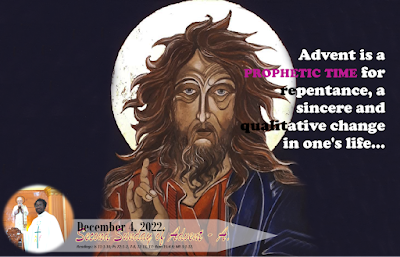FRATERNAL CORRECTION OR THE DEBT OF LOVE.
September 6, 2020
Readings: EZ 33:7-9; PS 95:1-2, 6-7, 8-9; ROM 13:8-10; MT 18:15-20.
An Ethiopian proverb says, “The person who grew up without
correction will find his mouth slipping instead of his foot.” A Danish proverb
adds, “Correction is good when administered in time and with love.”
“If you do not speak out to dissuade the wicked from his
way, I will hold you responsible for his death.” If there is one beautiful
spiritual and human exercise that could be an expression of genuine love, it is
none other but fraternal correction. By definition, fraternal or spiritual
correction consists of admonishing one’s neighbor by a private individual with
the purpose of reforming him or, if possible, preventing his sinful indulgence.
St. Thomas Aquinas lays the moral grounds of that exercise. He teaches that by
faith and because of our belongingness to Christ, we have the moral obligation
to offer correction to each other. He says, “To correct the wrongdoer is a
spiritual alms deed. But alms deeds are works of charity, as stated above.
Therefore, fraternal correction is an act of charity (The Summa Theologiæ,
II-II:33:1). For the 'Doctor Angelicus', we have it as an obligation to speak
the truth when someone is in error. To keep quiet in front of obvious
sinfulness or fault of one’s brother is to make oneself participant and
co-responsible of that sin and guilty with the sinner.
In Christian life, silence in front of evil is a pang of
guilt worthy of punishment. For, he who loves expresses his love by correcting
and helping the sinner to avoid or get out from the snares of the evil.
The liturgy of this 23rd Sunday in Ordinary Time A is beautiful
catechesis on the exercise of spiritual and fraternal correction. In the first
reading, the Lord makes it clear to the Prophet Ezekiel. He is warned on his
obligation to admonish sinners of their sins. Just like the prophet, the Lord
has appointed each one of us as sentry of our brothers and sisters. We have,
therefore, the duty to tell them the truth and exhort each other to repentance.
We are liable for one another’s life or death before God.
St. Paul, in the second reading, will insist on this liability
calling it a debt. The Apostle of the Gentiles tells to the Romans, “Brothers
and sisters: Owe nothing to anyone, except to love one another.” As says the
apostle, we should strive to avoid any other debt toward others, but only one
should be our obligation, the debt of love. And Paul gives the reason, “for the
one who loves another has fulfilled the law.” The words here have all their
meanings and strength. Love for each other is an obligation, not an option.
When we carry out that obligation, we have fulfilled all the other obligations
of the Law. Love is the summary of all and the answer or solution to all.
Love, brethren, makes it a divine obligation for you and me
to tell the truth to each other. Love obliges us to admonish one another when
we sin. When there is love, there is no fear of telling the truth. For, it is
done with charity and in order to help.
The Gospel comes to crown the teaching on fraternal love.
The Lord Jesus teaches his disciples on what consists of fraternal correction
and how it should be given, the steps to be followed. Fraternal correction,
like any other spiritual exercises, obeys to some rules, mainly three steps: First,
it must be an interpersonal and individual exercise. Hence the Lord said: “If
your brother sins against you, go and tell him his fault between you and him
alone.” When the first phase fails, the second step consists to call a witness.
If that second step fails, then comes the third, bring the matter before the
Church. And then, if this third attempt is proved unsuccessful, nothing is left
to do, but to dismiss the unrepentant brother, consider him as a pagan.
The teaching of Jesus on fraternal correction raises the
triple dimension of sin. Sin is first a private and individual or interpersonal
matter. But then it can turn to be involving one or two others people before
becoming a communal matter. In this regard, St. Thomas Aquinas emphasizes: “Now
a man's sin may be considered in two ways, first as being harmful to the
sinner, secondly as conducing to the harm of others, by hurting or scandalizing
them, or by being detrimental to the common good, the justice of which is
disturbed by that man's sin.” So, the Lord teaches us how to exercise
discipline in the Church as a community of brothers and sisters, gathered and
united by the same love.
It is sad to see that, very often, many people forget or do
not take seriously their obligation toward their brothers and sisters. Though
we call each other brother and sister and even sing love, we do not say the
truth to each other. We live in hypocrisy. We see and know what others do and
how wrong are their actions, but then, either out of fear or selfishness, we do
not tell them about it to help them amend their life. It is only when the worse
happen, we react, claiming that we were aware of it.
I heard one day the sad story of one former seminarian, and
that is common in the formation houses. It was a very good young man, convinced
of his vocation and very willing to become a priest. He was, however, seduced
by a young lady who used to visit the seminary. The companions of the boy knew
about the fact, but none of them told him of the risk for his vocation, neither
asked help from the formators. Rather, some even encouraged him, by covering
his nocturnal outings from home and his absences during activities. Sadly, the
time came when the boy could no longer hide and decided to leave. It is only
after he left the seminary, that his companions, one by one started revealing
the deal and confessing that they knew all about it. Nevertheless, they did
nothing to help the one they used to call their brother. A palpable sign that
there was no genuine brotherly love between them, otherwise they would have
helped the buddy save his vocation.
Fraternal correction is the debt we owe one another out of
love and because of our common belonging to Christ. Through it, we learn that
true love is not selfish. Therefore, to love means not to seek oneself, but
rather the good of the one whom we love. Sincere love is the most altruistic
virtue.





Comments
Post a Comment